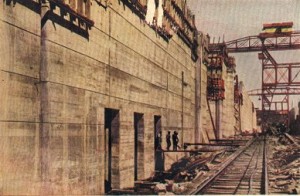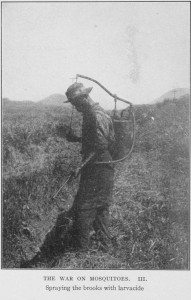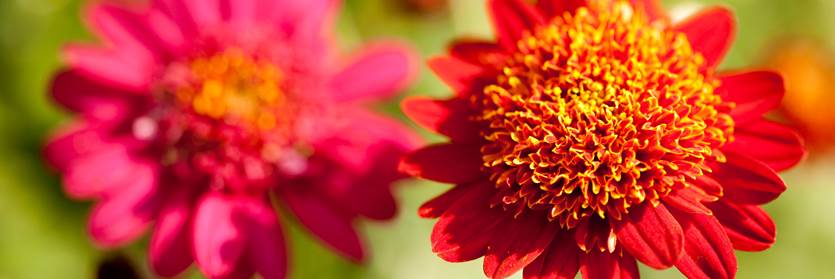The Diary of H.H. Rusby: Through the Panama Canal
Posted in From the Library, Science on June 8 2013, by Anthony Kirchgessner

Week two of Henry Hurd Rusby‘s Mulford Expedition sees the Santa Elisa passing through the Panama Canal (see Week One). At the time of this writing, the Canal has been open for less than seven years, and as we read, construction is ongoing. The Canal’s most profound immediate effect is a quicker and safer journey between the Atlantic and Pacific Oceans. A voyage from New York to San Francisco saves over 7,800 miles and the ship avoids navigating the hazardous Drake Passage and Cape Horn.
Dr. Rusby mentions the ceremony of the Court of Neptune, also known as the Line-crossing Ceremony, whereby a commemoration of a sailor’s first crossing of the equator is performed. This ceremony is also performed for passenger’s entertainment aboard civilian ocean liners such as the Santa Elisa. Few details are given by Dr. Rusby, but the ceremony has its colorful characters, including the King of Neptune and Davy Jones.
OFFICIAL DIARY of the MULFORD BIOLOGICAL EXPLORATION OF THE AMAZON BASIN
H. H. RUSBY, DIRECTOR

WEDNESDAY, JUNE 8, 1921.
The day passed without special incidents and everybody arranging to go ashore at Panama tomorrow.
I wrote a number of letters.
THURSDAY, JUNE 9, 1921
We arrived at the Canal in the early afternoon and at once entered the gates, making a prompt ascent to Gatun Lake. Then we found that it was too late to traverse and we anchored for the night. Not a sign of a mosquito was noted.
Mr. McCarty left us, to cross the isthmus by rail and attend to some matters at Panama City.
During the evening there was some excitement among the boiler and engine men. We gathered that they were endeavoring to engineer a strike and were quite fearful of some result that would necessitate a long delay.
FRIDAY, JUNE 10, 1921.
We were in motion shortly after 6 a.m. and enjoyed a lovely sail to the Pacific locks, which were passed in the late fornoon. This ride was not only very beautiful, among the numerous lovely little tropical islands, but very interesting, because of the various mechanical operations, such as dredging and excavating that was still going on.
At noon we were at the dock, taking on fuel oil, and were informed that the ship would sail at 4:30 p.m.
I received a cablegram from home and went at once to the town to get it decoded, whereupon I replied to it. I mailed the letter and had a large bill changed and we then had lunch at the leading Panamanian Hotel of the town.
Mr. McCarthy had located an Evinrude motor, which we had been unable to obtain in New York and which was for sale at $135.00, only $25 [more] than the New York price. I bought it and have it on board in my cabin before 3 O’clock.
We went into the baggage room and had our baggage rechecked, so that nearly all of it will be landed at Arica, instead of Mollendo to be take to la Paz and travel in this car with the baggage. This will suit them better as to the day of starting and they will ascend more slowly and more comfortably.
I have studied out the best method of treatment against “Sorochi” and I shall outfit them accordingly.
Our ship did not leave until eight O’clock and before bedtime we were in the big swell of the broad Pacific.

SATURDAY, JUNE 11, 1921
In spite of the broad ocean swell, the sea was quite calm and the day was passed very comfortably. I did a little book-keeping devoted the rest of the day to letter writing and reading, and to the study of my book on tropical diseases.
SUNDAY, JUNE 12, 1921
The day passed uneventfully, except for the ceremony of the Court of Neptune, when we crossed the Equator, at 2:30 p.m. This was very interesting and entertaining. [Here’s a silent video of one version of the ceremony from 1928 featuring president elect Herbert Hoover and his son Allan.] During the remainder of the day, I continued my study of various matters pertaining to our work. I have been taking my temperature morning and evening for two days, and it has stayed pretty steady, at 97 1/2.
MONDAY, JUNE 12, 1921
Have occupied the day mostly in studying typical diseases and going over my list of medicines to see if any important thing has been overlooked. Have found several, which I will get in Lima, where we are to land, day after tomorrow.
Have watched several whales today, and have run close to the coast most of the time, so that we could see the mountains and the towns along the coast. My glasses are very fine indeed and greatly admired by the ship’s officers.
My temperature this morning was 99, and yesterday morning sputum was streaked with blood. However, I feel well and regard these things as mere traces of my late trouble.
Dr. Tovar has described to me the making of chalone, as follows: The sheep is killed and simply dressed. All possible fat is cut out and the bones area all chopped through a short distance, so the carcass will lie out flat. These are then piled up and covered tightly, to keep out flies, and left for some hours to undergoe a sweating process, after which they are laid out singly in the sun to dry, that this is accomplished without decomposition. Much care has to be taken to exclude flies until the drying is mostly accomplished.
This evening we had a boxing match among the negro sailors, which furnished a fair evening’s entertainment.
My evening temperature is 98, against 99 this morning.
TUESDAY, JUNE 14, 1921
The day passed uneventfully except that the ocean swell was sufficiently severe to keep me reclining in my chair, and I was unable to do much work.

